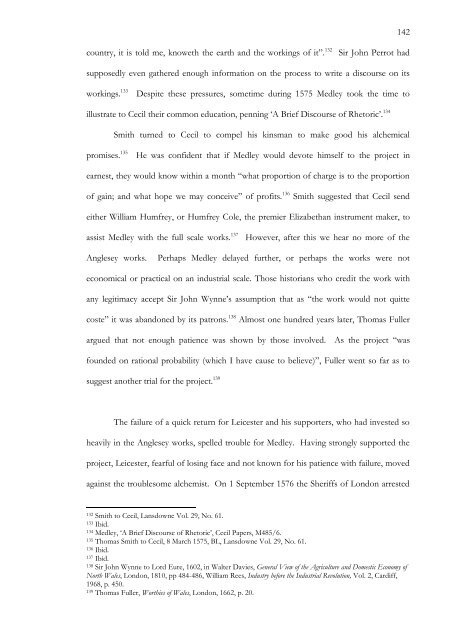The Alchemical Patronage of Sir William Cecil, Lord Burghley
The Alchemical Patronage of Sir William Cecil, Lord Burghley
The Alchemical Patronage of Sir William Cecil, Lord Burghley
Create successful ePaper yourself
Turn your PDF publications into a flip-book with our unique Google optimized e-Paper software.
country, it is told me, knoweth the earth and the workings <strong>of</strong> it‖. 132 <strong>Sir</strong> John Perrot had<br />
supposedly even gathered enough information on the process to write a discourse on its<br />
workings. 133 Despite these pressures, sometime during 1575 Medley took the time to<br />
illustrate to <strong>Cecil</strong> their common education, penning ‗A Brief Discourse <strong>of</strong> Rhetoric‘. 134<br />
Smith turned to <strong>Cecil</strong> to compel his kinsman to make good his alchemical<br />
promises. 135 He was confident that if Medley would devote himself to the project in<br />
earnest, they would know within a month ―what proportion <strong>of</strong> charge is to the proportion<br />
<strong>of</strong> gain; and what hope we may conceive‖ <strong>of</strong> pr<strong>of</strong>its. 136 Smith suggested that <strong>Cecil</strong> send<br />
either <strong>William</strong> Humfrey, or Humfrey Cole, the premier Elizabethan instrument maker, to<br />
assist Medley with the full scale works. 137 However, after this we hear no more <strong>of</strong> the<br />
Anglesey works. Perhaps Medley delayed further, or perhaps the works were not<br />
economical or practical on an industrial scale. Those historians who credit the work with<br />
any legitimacy accept <strong>Sir</strong> John Wynne‘s assumption that as ―the work would not quitte<br />
coste‖ it was abandoned by its patrons. 138 Almost one hundred years later, Thomas Fuller<br />
argued that not enough patience was shown by those involved. As the project ―was<br />
founded on rational probability (which I have cause to believe)‖, Fuller went so far as to<br />
suggest another trial for the project. 139<br />
<strong>The</strong> failure <strong>of</strong> a quick return for Leicester and his supporters, who had invested so<br />
heavily in the Anglesey works, spelled trouble for Medley. Having strongly supported the<br />
project, Leicester, fearful <strong>of</strong> losing face and not known for his patience with failure, moved<br />
against the troublesome alchemist. On 1 September 1576 the Sheriffs <strong>of</strong> London arrested<br />
132 Smith to <strong>Cecil</strong>, Lansdowne Vol. 29, No. 61.<br />
133 Ibid.<br />
134 Medley, ‗A Brief Discourse <strong>of</strong> Rhetoric‘, <strong>Cecil</strong> Papers, M485/6.<br />
135 Thomas Smith to <strong>Cecil</strong>, 8 March 1575, BL, Lansdowne Vol. 29, No. 61.<br />
136 Ibid.<br />
137 Ibid.<br />
138 <strong>Sir</strong> John Wynne to <strong>Lord</strong> Eure, 1602, in Walter Davies, General View <strong>of</strong> the Agriculture and Domestic Economy <strong>of</strong><br />
North Wales, London, 1810, pp 484-486, <strong>William</strong> Rees, Industry before the Industrial Revolution, Vol. 2, Cardiff,<br />
1968, p. 450.<br />
139 Thomas Fuller, Worthies <strong>of</strong> Wales, London, 1662, p. 20.<br />
142















